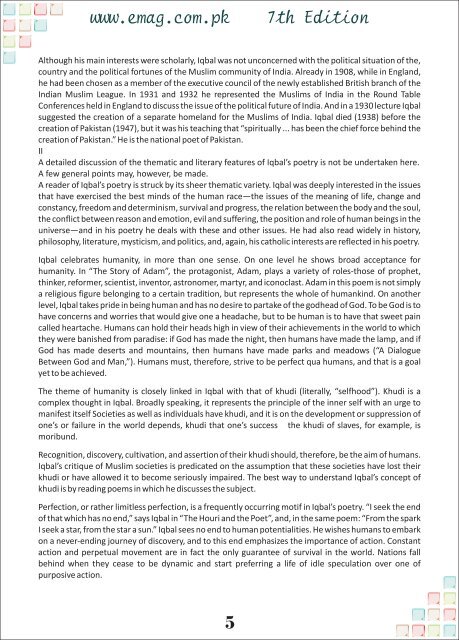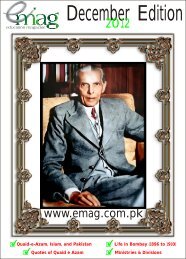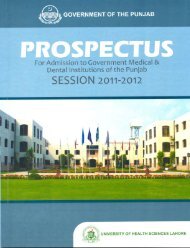You also want an ePaper? Increase the reach of your titles
YUMPU automatically turns print PDFs into web optimized ePapers that Google loves.
www.emag.<strong>com</strong>.<strong>pk</strong><br />
7th Edition<br />
Although his main interests were scholarly, Iqbal was not unconcerned with the political situation of the,<br />
country and the political fortunes of the Muslim <strong>com</strong>munity of India. Already in 1908, while in England,<br />
he had been chosen as a member of the executive council of the newly established British branch of the<br />
Indian Muslim League. In 1931 and 1932 he represented the Muslims of India in the Round Table<br />
Conferences held in England to discuss the issue of the political future of India. And in a 1930 lecture Iqbal<br />
suggested the creation of a separate homeland for the Muslims of India. Iqbal died (1938) before the<br />
creation of Pakistan (1947), but it was his teaching that “spiritually ... has been the chief force behind the<br />
creation of Pakistan.” He is the national poet of Pakistan.<br />
II<br />
A detailed discussion of the thematic and literary features of Iqbal’s poetry is not be undertaken here.<br />
A few general points may, however, be made.<br />
A reader of Iqbal’s poetry is struck by its sheer thematic variety. Iqbal was deeply interested in the issues<br />
that have exercised the best minds of the human race—the issues of the meaning of life, change and<br />
constancy, freedom and determinism, survival and progress, the relation between the body and the soul,<br />
the conflict between reason and emotion, evil and suffering, the position and role of human beings in the<br />
universe—and in his poetry he deals with these and other issues. He had also read widely in history,<br />
philosophy, literature, mysticism, and politics, and, again, his catholic interests are reflected in his poetry.<br />
Iqbal celebrates humanity, in more than one sense. On one level he shows broad acceptance for<br />
humanity. In “The Story of Adam”, the protagonist, Adam, plays a variety of roles-those of prophet,<br />
thinker, reformer, scientist, inventor, astronomer, martyr, and iconoclast. Adam in this poem is not simply<br />
a religious figure belonging to a certain tradition, but represents the whole of humankind. On another<br />
level, Iqbal takes pride in being human and has no desire to partake of the godhead of God. To be God is to<br />
have concerns and worries that would give one a headache, but to be human is to have that sweet pain<br />
called heartache. Humans can hold their heads high in view of their achievements in the world to which<br />
they were banished from paradise: if God has made the night, then humans have made the lamp, and if<br />
God has made deserts and mountains, then humans have made parks and meadows (“A Dialogue<br />
Between God and Man,”). Humans must, therefore, strive to be perfect qua humans, and that is a goal<br />
yet to be achieved.<br />
The theme of humanity is closely linked in Iqbal with that of khudi (literally, “selfhood”). Khudi is a<br />
<strong>com</strong>plex thought in Iqbal. Broadly speaking, it represents the principle of the inner self with an urge to<br />
manifest itself Societies as well as individuals have khudi, and it is on the development or suppression of<br />
one’s or failure in the world depends, khudi that one’s success the khudi of slaves, for example, is<br />
moribund.<br />
Recognition, discovery, cultivation, and assertion of their khudi should, therefore, be the aim of humans.<br />
Iqbal’s critique of Muslim societies is predicated on the assumption that these societies have lost their<br />
khudi or have allowed it to be<strong>com</strong>e seriously impaired. The best way to understand Iqbal’s concept of<br />
khudi is by reading poems in which he discusses the subject.<br />
Perfection, or rather limitless perfection, is a frequently occurring motif in Iqbal’s poetry. “I seek the end<br />
of that which has no end,” says Iqbal in “The Houri and the Poet”, and, in the same poem: “From the spark<br />
I seek a star, from the star a sun.” Iqbal sees no end to human potentialities. He wishes humans to embark<br />
on a never-ending journey of discovery, and to this end emphasizes the importance of action. Constant<br />
action and perpetual movement are in fact the only guarantee of survival in the world. Nations fall<br />
behind when they cease to be dynamic and start preferring a life of idle speculation over one of<br />
purposive action.<br />
5






